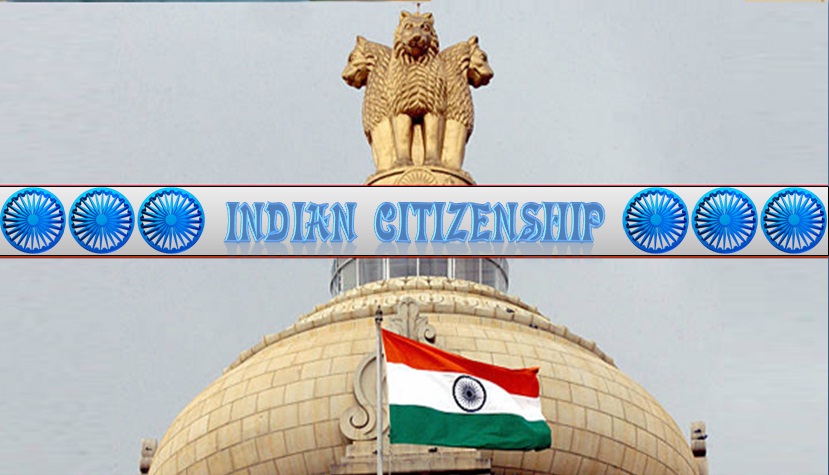AnalyticsBreaking News
Modi Govt. delegates its powers on granting citizenship


–DHARMANANDA DEB, Advocate
Lots of legislation is done under delegated legislation. Most of the Acts have specific provisions for delegated legislation authorizing executive to make rules or take some specific decisions/orders with a provision to publication in gazette such rules / decision/Orders has a force of law. The citizenship Act, 1955 was enacted to provided for the acquisition and determination of Indian citizenship. It received the assent of the President on 30th December, 1955 was published in the Gazette on the same day. Section 16 of the said Citizenship Act has delegated power to the Central Government. In exercise of the powers conferred by Section 16 of the Citizenship Act, the Union Government only delegates its power (empowered) to District Magistrates of certain Districts and State Home Secretaries of seven states namely Chhattisgarh, Gujarat, Madhya Pradesh, Maharashtra, Rajasthan, Uttar Pradesh and Delhi to accept online applications to grant citizenship to “persecuted minorities” from Pakistan, Afghanistan and Bangladesh living in India.

The Union Home Ministry has also given powers to District Magistrates and state home secretaries of seven states for “grant of certificate of naturalisation under Section 6 of the Citizenship Act” or “grant of certificate of registration under Section 5 of the Citizenship Act”. Since citizenship is in the Union list, only the central government enjoys the power to grant citizenship unless delegated. According to the orders issued on 23rd December,2016(vide Notification No,4132(E)), “the central government hereby directs that powers exercisable by it, for registration as a citizen of India under Section 5 or for grant of certificate of naturalisation under Section 6 of the Citizenship Act, 1955 in respect of any person belonging to minority community in Pakistan, Afghanistan, and Bangladesh namely Hindus, Sikhs, Buddhists, Jains, Parsis and Christians…shall also be exercisable by the collector and the secretary of the department of home of the state or the UT.”

The said delegation of powers is valid for two years. But the delegated officials are unable to finish the process of granting citizenship in their respective states. Large number of such migrants residing in different District of the States were pending. So it is highly necessary to extend the said delegation of powers order. Meanwhile, the Rajasthan Chief Minister Vasundahara Raje requested the Union Home Ministry in the first week of June,2018 to extend the said time window by one or more year. Hence, the Union Home Ministry has extended the powers by issuing a fresh orders dated-23rd October, 2018 (Vide Notification No.5377 (E)) to District Magistrates and state home secretaries of seven states for “grant of certificate of naturalisation under Section 6 of the Citizenship Act” or “grant of certificate of registration under Section 5 of the Citizenship Act”. This order shall come into force w.e.f. 22nd December, 2018 and shall remain in force until further order.

The government notification also says that the secretary of the home department of the concerned state or Union Territory will have power to register refugees from the three countries as Indian nationals in case the applicant is not a resident of the mentioned districts, subject to certain conditions. Under the new rules, notified on October 23, the migrants can apply online, and the verification reports or the security clearance reports of the applicants shall be made available to the Centre through an online portal. “The Collector or the Secretary shall maintain an online/digital as well as physical register, containing the details of persons so registered or naturalised as a citizen of India and furnish a copy thereof to the Central government within seven days of registration,” the notification said.

It is also to be mentioned here that a similar notification empowering collectors in Gujarat and Rajasthan was issued in 2003-04 during the tenure of then PM Atal Bihari Vajpayee with a validity of one year. But Modi Government had in 2015 exempted Bangaldeshi, Pakisthani and Afghanistan Nationals, belonging to Hindu, Buddhist, Sikh, Christian and Jain Communities who entered into India on or before 31st December,2014, in respect of their entry and stay in India without proper documents or after the expiry of relevant documents by issuing two numbers of Notifications dated 7th September,2015.
Taking serious note of the condition of Hindu migrants from Pakistan, the Rajasthan High Court has issued a notice to the state and central governments seeking their response on why the matter of granting citizenship to them has been lingering. The court also took note of a recent case, wherein a migrant family was deported to Pakistan by officials for alleged violation of visa rules. While listing the matter for hearing on August 24, the court has also deputed two amici curiae to assist it. Taking suo moto cognizance of the issue, a division bench of Justices Govind Mathur and Vineet Kumar Mathur observed that “the traces of the tragedy of partition in Indian subcontinent much back in the year 1947 are yet visible with deep injuries in our society and one example of that is the desire of the persons belonging to minorities in Pakistan as well as Bangladesh to have shelter in India being discriminated for socio-economic and political reasons. A huge number of migrants from Pakistan are settled in different parts of the country including the western border.
As a matter of fact, from the eastern part of the Pakistan, Pakistan nationals are migrating to India in big number. It is a fact well known that thousands of such persons are having camps in the Districts of Barmer, Jaisalmer, Bikaner, Ganganagar and Jodhpur in the State of Rajasthan. Such migrants made several requests to the Government of India to award them Indian citizenship and the Government of India too acted upon time to time and issued several notifications/circulars to grant citizenship to such persons. In spite of the efforts made by the Government several people are yet residing in India without having Indian citizenship. Such people are in India being said to be persecuted in Pakistan. Being not Indian citizen the Government on several occasions considered it appropriate to deport them to their native country, but the predicament is that such persons, though facing enormous difficulties, for no fault on their part are not getting any peaceful space to have dignified life, a minimum requirement for human being”.
BJP promised citizenship to Hindu refugees in its manifesto for 2014 Lok Sabha polls. Ever since it assumed office, the Modi regime has taken a series of measures to facilitate grant of long-term visas to such refugees until they can be granted citizenship. The government recently moved a proposal to further facilitate the stay of long-term visa holders by offering Aadhaar cards, driving license and PAN cards. A parliamentary committee has been examining the Citizenship (Amendment) Bill, 2016, which proposes to grant citizenship to six persecuted minorities-Hindus, Jains, Sikhs, Parsis, Christians and Buddhists who came to India from Pakistan, Afghanistan and Bangladesh before December 31, 2014. Also, Section 2 (1)(b) of the Act will have a provision that will exempt such citizens from being deemed “illegal migrants”.
But for the State of Assam, it is necessary to make provisions for non-applicability of Section 6A of the present Act 1955 to the intended class of migrants to India from Bangladesh, Pakistan & Afghanistan who are now proposed to be granted Citizenship by “Naturalization” under Section 6 of the Act. Section 6A is a special provision about Citizenship of a class of persons from Assam and/or covered under Assam Accord, which describes and treats, at least after 24/03/1971(mid-night), this intended class of migrants from Bangladesh to Assam/India on ground of religious persecution there, as illegal migrant ineligible for acquisition of citizenship. Assam Accord being a political settlement, legislation is required to give effect to the relevant clauses of the Assam Accord relating to the foreigners issue. In line with this Accord,on 7th December,1985 a special provision only for the state of Assam is inserted in the citizenship Act,1955 i.e. Section 6-A defines various timelines for this intended class also, even prior to 24/03/1971 not to speak of post 1971, for being qualified to be a citizen of India. Under Section 6A of the Citizenship Act,1955 :
(i) All persons of Indian origin who had entered Assam before January 1, 1966 and been its ordinary residents were deemed to be Indian citizens;
(ii) All foreigners who crossed over to Assam between 1st January,1966 and 25th day of March,1971, would be disenfranchised for 10 years;
(iii) All foreigners who entered Assam on and after 25th day of March, 1971 would be deported;
The above provisions on the basis of the Assam Accord created new Citizenship criteria applicable to the state of Assam alone and not to the rest of the country. Besides these, some of the land mark cases linked to citizenship in Assam. These land mark cases are as follows:-
In 2005, a three-judge Bench led by Chief Justice of India R C Lahoti struck down the IMDT Act. It expressed concern over demographic change in Assam, and made references to “international Islamic fundamentalism” (Sarbananda Sonowal vs Union Of India & Anr, July 12, 2005; Sonowal, now Chief Minister of Assam, was then an Asom Gana Parishad MP). In 2007, the court quashed the Foreigners (Tribunals for Assam) Order, 2006, which put the onus of proving a person a foreigner on the complainant (Sonowal II, December 5, 2006). In Assam Public Works vs Union Of India & Ors (W.P©274 of 2009), Assam Sanmilita Mahasangha & Ors vs Union Of India & Ors (W.P©562 of 2012),and All Assam Ahom Association & Ors. Versus Union of India & Ors (WRIT PETITION (CIVIL) NO. 876 OF 2014), Judgment dated-December 17, 2014, where a two-judge bench of the apex court of our country had framed 13 questions in Para 33 of the aforesaid Judgment, for deliberation by a larger constitutional bench i.e. minimum 5 Judges under Article 145(3), which included as to whether section 6A violates the Articles of the Constitution by diluting the political rights of citizens of Assam. An enumeration of these questions is as follows:
(i) Whether Articles 10 and 11 of the Constitution of India permit the enactment of Section 6A of the Citizenship Act in as much as Section 6A, in prescribing a cut-off date different from the cut-off date prescribed in Article 6, can do so without a “variation” of Article 6 itself; regard, in particular, being had to the phraseology of Article 4 (2) read with Article 368 (1)?
(ii) Whether Section 6A violates Articles 325 and 326 of the Constitution of India in that it has diluted the political rights of the citizens of the State of Assam;
(iii)What is the scope of the fundamental right contained in Article 29(1)? Is the fundamental right absolute in its terms? In particular, what is the meaning of the expression “culture” and the expression “conserve”? Whether Section 6A violates Article 29(1)?
(iv) Whether Section 6A violates Article 355? What is the true interpretation of Article 355 of the Constitution? Would an influx of illegal migrants into a State of India constitute “external aggression” and/or “internal disturbance”? Does the expression “State” occurring in this Article refers only to a territorial region or does it also include the people living in the State, which would include their culture and identity?
(v) Whether Section 6A violates Article 14 in that, it singles out Assam from other Border States (which comprise a distinct class) and discriminates against it. Also whether there is no rational basis for having a separate cut-off date for regularizing illegal migrants who enter Assam as opposed to the rest of the country; and
(vi) Whether Section 6A violates Article 21 in that the lives and personal liberty of the citizens of Assam have been affected adversely by the massive influx of illegal migrants from Bangladesh.
(vii) Whether delay is a factor that can be taken into account in molding relief under a petition filed under Article 32 of the Constitution?
(viii) Whether, after a large number of migrants from East Pakistan have enjoyed rightsas Citizens of India for over 40 years, any relief can be given in the petitions filed in the present cases?
(ix) Whether section 6A violates the basic premise of the Constitution and the Citizenship Act in that it permits Citizens who have allegedly not lost their Citizenship of East Pakistan to become deemed Citizens of India, thereby conferring dual Citizenship to such persons?
(x) Whether section 6A violates the fundamental basis of section 5 (1) proviso and section 5 (2) of the Citizenship Act (as it stood in 1985) in that it permits a class of migrants to become deemed Citizens of India without any reciprocity from Bangladesh and without taking the oath of allegiance to the
Indian Constitution?
(xi) Whether the Immigrants (Expulsion from Assam) Act,1950 being a special enactment qua immigrants into Assam, alone can apply to migrants from East Pakistan/Bangladesh to the exclusion of the general Foreigners Act and the Foreigners (Tribunals) Order, 1964 made there under?
(xii) Whether Section 6A violates the Rule of Law in that it gives way to political expediency and not to Government according to law ?
(xiii) Whether Section 6A violates fundamental rights in that no mechanism is provided to determine which persons are ordinarily resident in Assam since the dates of their entry into Assam, thus granting deemed citizenship to such persons arbitrarily?




Simply superb! It has clarified many confusions to many laymen like me had on the issue. Congratulation to the author for the excellent work done. for such an excellent write-up.
Thanks Sir for your words of appreciation. Stay tuned with us for many such write ups.
Regards
way2barak